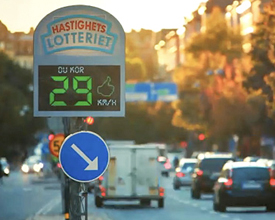Last week I attended the BC Chapter of the American Marketing Association‘s Vision Conference. They had some great talks, but the really “sticky” one for me was given by Gabe Zichermann, CEO of Dopamine Creative, and author of The Gamification Revolution. Gabe spoke about how forward-thinking marketers are leveraging gamification, considered the next wave of social engagement, to achieve their business goals. Gabe was careful to explain that gamification does NOT mean putting a video game on your website. More purposefully, it means building fun and reward into customer interaction. This is proving to be an increasingly effective tool for engaging consumers, especially Millennials, many of whom have grown up as gamers. Gabe had some fun and fascinating examples. These included:
Sweden’s Speed Ticket Lottery Cuts Speeding:
 Sweden used game-based thinking to modify the behaviour of drivers, by rewarding those driving under the speed limit. How? Radar cameras recorded the license plates of cars going at or under the speed limit, in addition to those of speeders. If you were caught driving at or under the speed limit, your name was entered into a lottery to win part of the proceeds from the fines collected from speeders. Brilliant! The result? The average speed of cars travelling through a school zone went from 32km/h before the system’s installation to 25km/h.
Sweden used game-based thinking to modify the behaviour of drivers, by rewarding those driving under the speed limit. How? Radar cameras recorded the license plates of cars going at or under the speed limit, in addition to those of speeders. If you were caught driving at or under the speed limit, your name was entered into a lottery to win part of the proceeds from the fines collected from speeders. Brilliant! The result? The average speed of cars travelling through a school zone went from 32km/h before the system’s installation to 25km/h.
Domino’s Pizza Hero Finds Job Applicants:
Domino’s Pizza has an app, Pizza Hero, that lets you build your own pizza, scores you on time and quality, lets you order your tasty creation upon completion, and even measures your ability to follow instructions. (Hint: you can earn bonus points by physically motioning your ipad forward like you are sliding a pizza into an oven, rather than just clicking “next”). But here`s where the genius really comes in: Pizza Hero doubles as a job-training and recruitment tool. If you pass its introductory challenges, you’ll be prompted to apply for a job at Domino’s. The app loads the real Domino’s career page, with links to a job application! This addresses one of Domino’s primary business challenges: staffing.
Receipts Doubling as Lottery Tickets Dupe Tax Cheaters in China:
Sales tax evasion was a huge problem in China. Businesses would purposely not issue receipts on sales, to avoid paying the sales tax. To positively reward consumers for demanding a receipt, the Chinese government introduced a scratch lottery system, whereby your receipt doubled as lottery scratch card. Following the implementation of the program, the frequency of customers asking for receipts increased dramatically. Those who had never requested receipts began asking for them one out of every two transactions, and tax revenues increased proportionately. The lesson here is simple. If governments want to encourage good citizenship, they should try making the desired behavior more fun. Make a game of it!
I loved this presentation. Speakers are so much more engaging when they use real world examples! If you want to learn more, Gabe has a TedTalk on How Games Make Kids Smarter, which you can find on YouTube here.